Bob Ross Documentary Creates Huge Reputation Damage for Bob Ross, Inc.
In: Online Reputation Management - ORM|Reputation Damage Examples
3 Sep 2021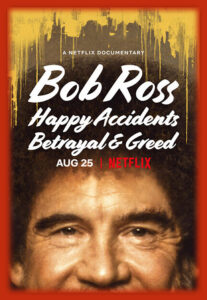
Betrayal & Greed Documentary
My wife and I watched “Bob Ross: Happy Accidents, Betrayal & Greed,” the new documentary about the famous PBS landscape painter last night. The film reveals how Ross’s business partners, Annette and Walt Kowalski, wrested the bulk of Bob Ross’s estate from his son, wife, and half-brother, and now operate a business with the artist’s intellectual property called “Bob Ross Inc.”. The documentary is nothing short of a devastating blow to the reputation of the Bob Ross Inc. company, threatening the company’s short-term and long-term revenue prospects due to the outrage of the public and Bob Ross’s fans.
The small artist’s empire was purportedly obtained by the Kowalski family through aggressive or predatory litigation. But, what they won in legal court they are now standing to lose in the court of public opinion.
As a Reputation Management specialist, I have seen many individuals and companies that have been harmed by reputation-impacting content, and this is one of the most serious examples I have seen in a while. The documentary is highly damaging to the company’s image, but there are steps they could take to turn things around.
Let me explain.
First, I am not saying that I necessarily think the company and its owners are innocent or necessarily deserving of reputation rehabilitation. But, I have worked on enough reputation crises to know that there may be a lot more to the full story than what has been publicly revealed thus far. The company claims that the documentary was one-sided, and anyone can see that this is true. There may be mitigating circumstances and other information that would counter or qualify all of the negative representations made about Annette and Walt Kowalski.
The story is interesting to me because I work in Reputation Management — I’m often asking myself whether an entity’s reputation can be fixed after a media feeding frenzy like this occurs. So, I am mainly writing this as an example of a heavily damaged company that now needs to take steps to stem the bleeding, just as the bleeding has begun, and I’m showing that companies in this position are not really helpless. But, without expert guidance, they are going to crash further.
Make no mistake, the company is now bleeding, whether they fully realize the extent of their injuries or not. Fans are calling for a boycott of all of their products, and it likely will not be long before companies that carrry their products will completely drop them due to their own outrage, or because their customer base may push them to remove Bob Ross Inc. from their inventories.
There is now a spike of searcher interest happening due to the impact of the documentary. Google Trends is showing that searches for “Bob Ross” have abruptly increased by around 12 times as much as they had been, and the spike has not really stopped.
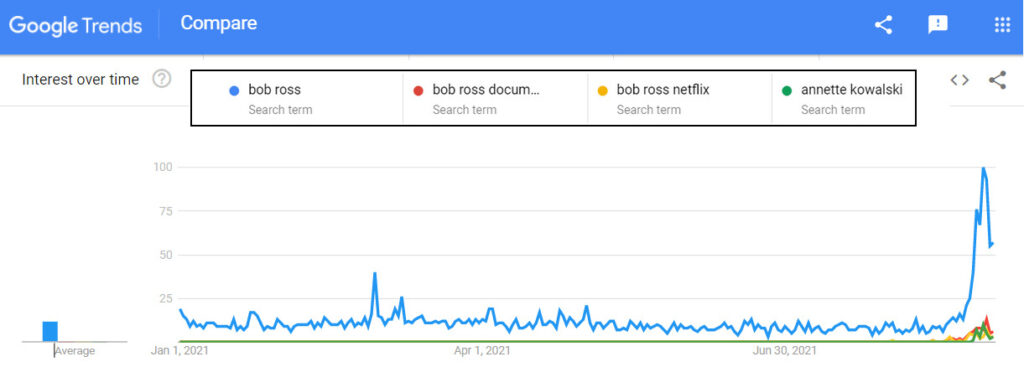
You can also see a small spike in related searches, such as for “bob ross documentary”, “bob ross netflix”, and “annette kowalski.”
But, this spike in consumer interest is not something they are going to be profiting from — Google’s search results page is full of negative articles referring to the documentary. Highlighting in red each item that is negative shows that roughly 40% of search results for “Bob Ross” on Google are linked to negative media, and reporting on the damaging documentary.
Bob Ross Inc. issued a statement in response to the documentary, which is a pretty standard crisis communications step. The statement says they take issues with the documentary, and they were not particularly given an opportunity to address the contentions in the film. The statement asserts:
If not for the efforts of the remaining founders and their dedication to this mission, Bob’s artistic and cultural relevance – and his expressed desire to become the world’s most beloved painting teacher and friend – would have been lost decades ago with his passing.
This statement falls flat, because Bob Ross’s shows, personality, and popularity likely would not have “been lost” or waned, so this statement does not make fans feel like “oh, I’m so grateful the Kowalskis took over because I would have otherwise lost Bob Ross after he died.” I’m sure it’s true that licensing deals, products, and professional management and protection of his intellectual property all helped to keep him relevant — but that does not really convince us that none of this would have happened had Bob Ross’s son, half-brother, and wife remained in control of his legacy, or had retained some part ownership in the Bob Ross Inc. company.
In fact, it is very easy to make the contention that the Kowalski’s may have gone seriously overboard in marketing of Bob Ross’s name, likeness and catchphrases. Part of good brand management is declining to license a trademark’s use for things that would cheapen or cause the brand itself some reputation damage, and one can criticize a number of products that have had Bob Ross branding over time. While Bob Ross is most definitely a pop culture icon, and reportedly had a great sense of humor and easy-going manner, his name and image should likely not be allowed to be used for kitschy products and things that would cheapen his image. I would say that Bob Ross represents a glowing example of Outsider Art, and he democratized painting landscapes in an extremely approachable manner. But, that cultivated casual manner does not mean that it is a good idea to apply his name and face to every product under the sun.
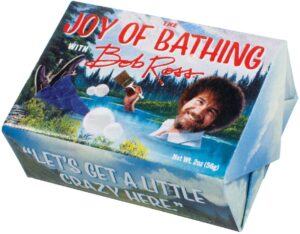 | 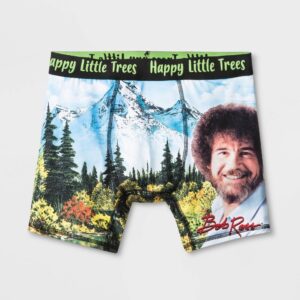 |
 | 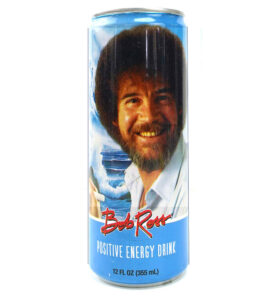 |
Bob Ross bar soap seems unrelated to anything involving the artist, his work and his themes. Why do this?
Bob Ross boxer shorts, bearing the catchphrase “Happy Little Trees”, is a kind of a tawdry joke which relies on the fact that “wood” or “trees” are used in slang to refer to a man’s penis and erections.
And, Bob Ross energy drinks and cereal — these are just not great applications for the Bob Ross brand.
These are all gag gifts. The danger is that if you cheapen a brand enough, it is no longer perceived to have high value. If Bob Ross’s name becomes a laughing-stock, will people want to attend classes to learn his painting technique? If he is a joke, will people perceive his paintings to have high value? This arguably devalues his legacy and the worth of his many paintings some.
Bob Ross’s son, Steve Ross, compellingly and convincingly claims that Bob Ross did not want his name and legacy completely controlled by the Kowalskis. It also is compelling that Steve Ross claims he does not receive money from the Bob Ross Inc. company — that strikes the public as highly unjust, and makes the rest of the negative assertions so convincing. How can they claim to represent Bob Ross’s desires if none of their profits over time are shared by Bob Ross’s inheritors?
Aside from the company’s statement, it is not apparent if they fully understand the impact this will have on their company and sales. It might take a year or two for that impact to be fully apparent, although I bet they have started bleeding already.
So, how do they address all this? Below are some thoughts I have as someone who has worked on reputation-damaging events:
- The official statement is insufficient. The statement falls short of addressing a number of the key issues that the public is outraged about. It does not explain the legal basis of prior agreements , litigation and settlements. It should have transparently mapped out why Bob Ross Inc. should have the legal right to the Bob Ross intellectual property, and why non of the proceeds are shared with Steve Ross, if not also others. They claim this was settled by a court of law years ago — that’s fair enough if they explain what the issues were, and why it was just the court found in their favor. It is possible there was a nondisparagement clause in that earlier settlement agreement, but the Netflix documentary would appear to have broken that on the part of the other party, so they could remain silent or bluntly address the negative representations. (If there was a nondisparagement and/or nondisclosure agreement, they may be keeping silent in order to retain the upper hand if there is further litigation — but, see my next observation about the strategy of launching a new lawsuit.) A more detailed statement is advisable if they wish to improve the situation — but, it is also possible that some of the contentions are true, in which case they would lose face further by explaining or listing out why they won in a court of law.
- Suing the participants and filmmakers of the documentary will not fix the problem. Launching a defamation lawsuit will be seen as them throwing weight around at vulnerable people all over again, in an effort to shut them up. There are instances where litigation is a great tactic for addressing defamation — I should know because I have served as an expert witness in multiple defamation cases. But, this will just reinforce the contentions in the film that the Kowalskis use lawsuits to bully people and shut them up. It could also backfire further, in court and in the public’s perception. Don’t do it!
- If you can’t fix this with a better official statement, or through a lawsuit, consider trying to make up for the perceived wrongs. Call up Steve Ross and try to negotiate a new profit-sharing and creative control arrangement. Announce massive donations to charities that align with Bob Ross’s ethos. Perhaps it should be announced that Steve Ross will be given a 20% share of ownership that will shift over to 51% control within a 5 to 10 year period. I can see the argument that the Kowalskis provided business management skills to the table, and they’ve done a lot of work to expand and improve profitability with the Bob Ross brand. But, they need to take a drastic step towards fixing this reputation damage.
Annette Kowalski once referred to Bob Ross in an interview as a “tyrant”, and that seems to demonstrate a very one-sided and selfish view along the lines of an attitude where the Kowalski’s think the Bob Ross phenomenon was more due to their work than Bob Ross’s himself. An artist by nature should retain creative control and quality control of their name, or their core DNA is lost from their enterprise.
The “Business 1.0” world of top-down control of companies has changed in many ways, and that old way of thinking and operating is more likely to widen and not heal the reputation damage that has happened to Bob Ross Inc.
If the Kowalskis realistically want to fix their reputation damage, it cannot be done purely through a spin-doctored, well-written official statement, nor can it be forcibly exacted through a new lawsuit. They will need to reach out to their detractors and try to be open to a more collaborative solution.
About [Ag] Search Blog
[Ag] is the symbol for the element Silver and is 47th in the periodic table of elements, an abbreviation for the Latin word for Silver, "Argentum". The [Ag] Search Blog is provided by Argent Media™.
Sharing research, thoughts, commentary about Internet Marketing, SEO, Social Media, Online Reputation Management, and our SEO Expert Witness services.
Photostream
Categories
- Branding & Trademarks (1)
- Industry News & Happenings (31)
- Legal Expert Witness (5)
- Local Search (16)
- Local SEO 101 (5)
- Online Reputation Management – ORM (26)
- Rich Snippets (3)
- Author Markup (2)
- Recipe Rich Snippets (1)
- Search Engine Optimization – SEO (13)
- Search Engines (10)
- SEM (1)
- Google Ads (1)
- Pay-Per-Click (1)
- Shopping Search (1)
- Social Media (14)
- Facebook (3)
- Google Plus (1)
- Twitter (2)
Archives
- June 2024
- January 2023
- September 2021
- December 2020
- May 2020
- December 2019
- October 2019
- March 2019
- January 2019
- November 2018
- October 2018
- September 2018
- July 2018
- June 2018
- January 2018
- November 2017
- October 2017
- July 2017
- January 2017
- December 2016
- March 2016
- September 2015
- August 2015
- June 2015
- May 2015
- April 2015
- March 2015
- February 2015
- June 2014
- April 2014
- October 2013
- September 2013
- August 2013
- March 2013
- February 2013
- January 2013
- December 2012
- November 2012
- July 2012
- June 2012
- May 2012
- March 2012
- February 2012
- January 2012
- Chris Silver Smith: I was approached by the Department of Justice some years ago to provide testimony regarding the pote [...]
- Sean Fagin: Interesting - I had not thought of this niche in SEO! I might have to try out doing this myself. Ho [...]
- How to Make Friends with Influencer Marketing - [Ag] Search Blog: […] My grant from the Chris Smith Institute for Exotic Travel was enough to cover both days of [...]
- Chris Silver Smith: Good point about Gawker being a muckraking site in of itself. But there are a number of others who [...]
- Rob M: Referencing Gawker for character assassination isn't so helpful since they were sued into oblivion b [...]
- AI: The Next Big Thing That “Kills” SEO
- What is an SEO expert called?
- Bob Ross Documentary Creates Huge Reputation Damage for Bob Ross, Inc.
- Online Reputation Management Services
- How does one become an SEO Expert Witness?
- What is an SEO Expert Witness?
- Local SEO Workshop Coming to SMX West 🧭
- Keynote at International Search Summit: International Reputation
- Hear About Twitter Optimization at Content Marketing Conference
- Reflections on Reputation – the New(ish) Quality Signal & Ranking Factor
![[Ag] Search Blog -](https://agsearchblog.com/wp-content/themes/compositio/logo.png)

Comments are closed.